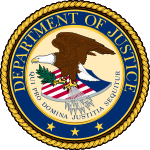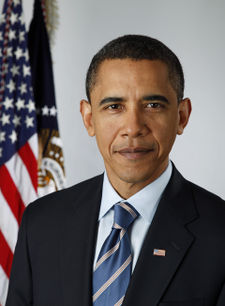Eric Holder
| Eric Holder | |
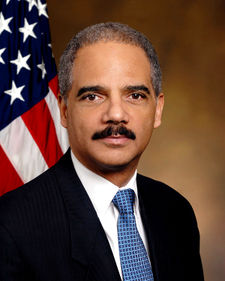 |
|
|
|
|
| Incumbent | |
| Assumed office February 3, 2009 |
|
| President | Barack Obama |
|---|---|
| Preceded by | Michael Mukasey |
| In office January 20, 2001 – February 2, 2001 Acting |
|
| President | George W. Bush |
| Preceded by | Janet Reno |
| Succeeded by | John Ashcroft |
|
Deputy Attorney General of the United States
|
|
| In office June 13, 1997 – January 20, 2001 |
|
| President | Bill Clinton |
| Preceded by | Jamie Gorelick |
| Succeeded by | Larry Thompson |
|
|
|
| Born | January 21, 1951 The Bronx, United States |
| Political party | Democratic Party |
| Spouse(s) | Sharon Malone |
| Children | Maya Brooke Eric |
| Alma mater | Columbia University Columbia Law School |
| Profession | Attorney at Law |
| Religion | Episcopal |
Eric Himpton Holder, Jr. (born January 21, 1951) is the 82nd and current Attorney General of the United States and the first African American to hold the position.[1] He is serving under President Barack Obama.
Holder previously served as a judge of the Superior Court of the District of Columbia, United States Attorney, Deputy Attorney General of the United States and worked at the law firm of Covington & Burling in Washington, D.C. He was senior legal advisor to then-Senator Barack Obama during Obama's presidential campaign and one of three members of Obama's vice-presidential selection committee.
Contents |
Early life
Eric H. Holder, Jr. was born in the Bronx, New York to parents with roots in Barbados.[2][3][4] Holder's father, Eric Himpton Holder, Sr. (1905–1970) was born in Saint Joseph, Barbados and arrived in the United States at the age of 11.[5][6] He later became a real estate broker. His mother, Miriam, was born in New Jersey, while his maternal grandparents were immigrants from Saint Philip, Barbados.[6] Holder grew up in East Elmhurst, Queens, and attended public school until the age of 10. When entering the 4th grade he was selected to participate in a program for intellectually-gifted students.[7] In 1969, he graduated from Stuyvesant High School in Manhattan and attended Columbia College, where he played freshman basketball and was co-captain of his team and earned a Bachelor of Arts degree in American history in 1973.[8] Holder received his Juris Doctor from Columbia Law School, graduating in 1976. He worked for the NAACP Legal Defense and Educational Fund during his first summer and the United States Attorney during his second summer.[7]
Career
After graduating from law school, Holder joined the U.S. Justice Department's new Public Integrity Section during an interval lasting from 1976 to 1988. During his time there, he assisted in the prosecution of Democratic Congressman John Jenrette for bribery discovered in the Abscam sting operation.[9] In 1988, then-President Ronald Reagan appointed Holder to serve on the Bench as a Judge of the Superior Court of the District of Columbia.[10]
Holder stepped down from the bench in 1993 to accept an appointment for U.S. Attorney for the District of Columbia from then-President Bill Clinton. He was the first black American U.S. Attorney in that office.[7] At the beginning of his tenure, he oversaw the conclusion of the corruption case against Dan Rostenkowski, part of the Congressional Post Office scandal.[9] He was a U.S. Attorney until his elevation to Deputy Attorney General in 1997. Holder also served on The George Washington University's Board of Trustees in 1996 and 1997.
Deputy Attorney General
In 1997, after the retirement of Jamie Gorelick, Clinton nominated Holder to be the next Deputy Attorney General under Janet Reno. Holder was confirmed several months later in the Senate by a unanimous vote.[11] During his confirmation hearing, Holder's opposition to the death penalty was questioned, but he pledged his intention to cooperate with the current laws and Reno, saying, "I am not a proponent of the death penalty, but I will enforce the law as this Congress gives it to us."[12] Holder was the first African-American to serve in that position.[7] Holder briefly served as Acting Attorney General under President George W. Bush until the Senate confirmed Bush's nominee John Ashcroft.[13]
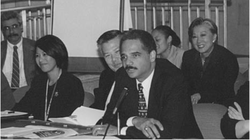
As Deputy Attorney General, Holder advised Reno about how far to go in the Justice Department's use of the Independent Counsel statute. Reno made the decision to permit Kenneth Starr to expand his investigation into the Lewinsky affair, leading to Clinton's impeachment.[7]
In his final days with the Clinton administration, Holder was involved with Clinton's last-minute pardon of fugitive and Democratic contributor Marc Rich. Between November 2000 and January 2001, Jack Quinn, Rich's lawyer and former White House Counsel from 1995–96, had been contacting Holder, testing the waters for the political viability of a presidential pardon. Quinn asked Holder for advice as to how he should proceed. According to Rich's attorney, Holder advised to circumvent standard procedures and to submit the pardon petition directly to the White House.[14].
After presenting his case to Holder in a November phone call and a last minute January 17 letter, Quinn arranged a phone call between the White House and Holder, asking the Deputy Attorney General to share his opinion on the Rich pardon. Holder gave Clinton a "neutral, leaning towards favorable" opinion of the pardon.[7] The reporter Joe Conason contends that Rich's pardon was actually a favor from Clinton to members of the Israeli government, for which Clinton hoped to gain progress in the peace talks between Israel and Palestine.[15].
During his February testimonies before the House Government Reform Committee and Senate Judiciary Committee, Holder argued his phone call was not intended as a formal Justice Department blessing of the pardon, saying, "my interaction with the White House, I did not view as a recommendation. Because... I didn't have the ability to look at all the materials that had been vetted through the way we normally vet materials."[16] He also did not believe his opinion would be interpreted as a go-ahead for the pardon. "What I said to the White House counsel ultimately was that I was neutral on this because I didn't have a factual basis to make a determination as to whether or not Mr. Quinn's contentions were in fact accurate, whether or not there had been a change in the law, a change in the applicable Justice Department regulations, and whether or not that was something that would justify the extraordinary grant of a pardon."[17] An investigation championed by Republican House Government Reform Committee chairman Rep. Dan Burton, concluded in a 2003 report covering 177 Clinton pardons, that Holder had played a significant role in facilitating the Rich pardon, first by recommending the well-connected Jack Quinn to Rich's legal representatives, by failing to fully inform prosecutors of the pending pardon, and by eventually delivering a "neutral leaning favorable" opinion to Clinton from a position of authority.[18] Holder has expressed some regret over his handling of the Rich pardon, stating "I wish I had done some things differently with regard to the Marc Rich matter. Specifically, I wish that I had ensured that the Department of Justice was more fully informed and involved in this pardon process", and called his own actions a "mistake".[19]
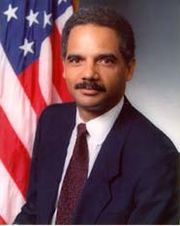
Holder was also involved in Clinton's decision to reduce the criminal sentences of 16 members of the Boricua Popular Army, an organization that has been categorized by the FBI as a terrorist organization. The clemency request was initially opposed in 1996 by U.S. Pardons Attorney Margaret Love. When Holder was elevated to Deputy Attorney General in 1997, he was asked to reexamine the issue by three members of Congress. In July 1999, Holder recommended clemency to Clinton with a report from then U.S. Pardons Attorney Roger Adams that neither supported nor opposed clemency. A month later, Clinton granted the clemency. According to The Hartford Courant, the clemency was unusual because it was opposed by the FBI, the federal prosecutor and the victims. According to the newspaper, it was also unusual because, before the commutations, the Boricua Popular Army members were not required to repudiate their actions, and they were not asked to provide any information concerning the whereabouts of Victor Manuel Gerena, a co-conspirator and one of the FBI Ten Most Wanted Fugitives, or the millions of dollars stolen by the group in a 1983 robbery of Wells Fargo in West Hartford, Connecticut.[20]
Private practice
From 2001 until he became Attorney General, Holder worked as an attorney at Covington & Burling in Washington, D.C., representing clients such as Merck and the National Football League.[2][7] He represented the NFL during its dog fighting investigation against Michael Vick.[21]
In 2004, Holder helped negotiate an agreement with the Justice Department for Chiquita Brands International in a case that involved Chiquita's payment of "protection money" to the United Self-Defense Forces of Colombia, a group on the U.S. government's list of terrorist organizations.[22][23] In the agreement, Chiquita's officials pleaded guilty and paid a fine of $25 million. Holder represented Chiquita in the civil action that grew out of this criminal case.[23]
In March 2004, Holder and Covington & Burling were hired by Illinois Governor Rod Blagojevich to act as a special investigator to the Illinois Gaming Board. The Gaming Board had voted 4-1 earlier that month to allow a casino to be built in Rosemont, Illinois. That vote defied the recommendation of the board's staff, which had raised concerns about alleged organized-crime links to the Rosemont casino's developer. The move had also raised concerns that the governor had named his close friend and fund-raiser, Christopher Kelly, as a "special government agent" to be involved in official state negotiations about the casino. Holder's legal work for the State of Illinois never materialized when the board reversed its decision and refused to hire Kelly. The investigation was subsequently canceled on May 18, 2004.[24]
The firm represented Guantanamo inmates but Holder "never participated directly in the firm's Guantanamo work", and is not expected to recuse himself from matters pertaining to it.[25]
While D.C. v. Heller was being heard by the Supreme Court in 2008, Holder joined the Reno-led amicus brief, which urged the Supreme Court to uphold Washington, D.C.'s handgun ban and said the position of the Department of Justice, from Franklin Roosevelt through Clinton, was that the Second Amendment does not protect an individual right to keep and bear arms for purposes unrelated to a State’s operation of a well-regulated militia.[26] Holder said that overturning the 1976 law "opens the door to more people having more access to guns and putting guns on the streets."[27]
In 2008, Holder represented the wife of Robert Wone, victim of a controversial and unsolved 2006 murder.[28]
Attorney General of the United States
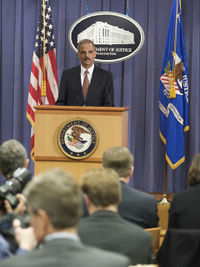
In late 2007, Holder joined then-United States Senator Barack Obama's presidential campaign as a senior legal advisor. He served on Obama's vice presidential selection committee.[10]
Holder favors closing the Guantanamo Bay detention camp, although he said in 2002 that the detainees are not technically entitled to Geneva Convention protections.[29][30] He is opposed to the Bush administration's implementation of the Patriot Act, saying it is "bad ultimately for law enforcement and will cost us the support of the American people."[31][32] He has been critical of Enhanced interrogation techniques and the NSA warrantless surveillance program, accusing the Bush administration of a "disrespect for the rule of law... [that is] not only wrong, it is destructive in our struggle against terrorism."[33]
On December 1, 2008, Obama announced that Holder would be his nominee for Attorney General.[34][35] He was formally nominated on January 20, 2009 and approved by the Senate Judiciary Committee on January 28.[36][37] Following his confirmation by the full Senate on February 2, 2009, he became the first African-American Attorney General of the United States. His installation took place on March 27, 2009 at the Lisner Auditorium of the George Washington University.
During his confirmation hearings in the Senate, Holder agreed with Senator Patrick Leahy, Democrat of Vermont, that a technique used by U.S. interrogators under the Bush administration known as waterboarding is torture.[38] Holder was confirmed by a 75-21 vote on February 2, 2009.[39]
Holder gave a speech on race relations on February 18, 2009, in the midst of Black History Month, in which he called the United States "a nation of cowards" on racial issues. "Though race-related issues continue to occupy a significant portion of our political discussion and though there remain many unresolved racial issues in this nation, we average Americans simply do not talk enough with each other about race," he said.[40] The speech stirred mild controversy, with some reacting favorably to Holder's comments and others sharply criticizing them.[41][42] Obama rebuked Holder's comments, saying that “I think it’s fair to say that if I had been advising my attorney general, we would have used different language”.[43]
When questioned about weapons regulations during a news conference to announce the arrest of Mexican drug cartel members, Holder stated that the Obama administration would seek to re-institute the expired Assault Weapons Ban, which he strongly supports.[44][45]
After the U.S. government filed suit against the Swiss bank UBS AG, whom Holder had represented during his time in private practice, the attorney general recused himself from all legal matters concerning the bank, which stands accused of conspiracy in U.S. tax fraud.[46][47]
On April 1, 2009, Holder announced that he had ordered the dismissal of the indictment against former Senator Ted Stevens on corruption charges. Stevens had been found guilty, but hadn't been sentenced; Holder's action effectively vacated Stevens' conviction. Holder was reportedly very angry that the prosecutors had withheld potentially exculpatory evidence from Stevens' attorneys. After the prosecutors had been held in contempt of court for failing to turn over required documents, Holder replaced the entire trial team. Soon afterward, the Justice Department discovered a previously undocumented interview with Bill Allen, the prosecution's star witness. In this interview, Allen gave statements that directly contradicted his testimony at trial, including a claim that he'd been asked to get a note for a repair bill on his house. By nearly all accounts, Holder wanted to send a message that he would not tolerate any behavior he deemed to be prosecutorial misconduct.[48]
Holder presented friend and predecessor Janet Reno, Attorney General under the Clinton Administration, the American Judicature Society's (AJS) Justice Award on April 17, 2009. The award is the highest given by the AJS, and recognizes significant contributions toward improvements in the administration of justice within the United States.[49]
On November 13, 2009, Holder announced that accused September 11 attack conspirators Khalid Sheikh Mohammed, Ramzi Bin al-Shibh, Walid bin Attash, Ali Abdul Aziz Ali and Mustafa Ahmed al-Hawsawi would be transferred from the military commission system to the U.S. District Court for the Southern District of New York for trial. He also expressed confidence that an impartial jury would be found "to ensure a fair trial in New York".[50]
Holder told the Senate Judiciary Committee on April 14, 2010, "No final decision has been made about the forum which Khalid Sheikh Mohammed and his co-defendants will be tried. As I said at the outset, this is a very close call."[51]
In May 2010 Holder expressed "concerns" about "Arizona’s tough new immigration law", saying that it might "lead to racial profiling". Holder was criticized for his testimony during a House Judiciary Committee hearing, when he said that he had "not read" the Arizona law and that he had formed his opinions on the basis of news reports.[52][53][54] In July 2010, Holder stated that the Justice Department filed suit against the Arizona law because it is preempted by federal law. Holder was quoted as saying, "I understand, first off, the frustration of the people of Arizona and the concerns that they have with regard to the amount of illegal immigration that occurs, but the solution that the Arizona legislature came up with is inconsistent with our federal Constitution."[55]
Holder's Department of Justice ended a civil suit originally brought by the Bush administration against members of the New Black Panther Party for alleged voter intimidation due to an apparent lack of evidence. This has caused controversy amongst conservative commentators, since some former members of the department, including J. Christian Adams, accused Holder and the Justice Department of dropping the case due to racial prejudice.[56][57] Other pundits have pointed out that DOJ officials at the end of the Bush Administration said that the facts of the case did not constitute a prosecutable criminal violation and refused to pursue this course of action before Obama was inaugurated.[58][59]
In July 2010, Holder flew to Kampala, Uganda to address the Heads of State Summit of the African Union, where he discussed the Obama Administration's priorities with regards to Africa and the terrorist bombings in Kampala during the World Cup[60][61]
Personal life
Holder is married to Dr. Sharon Malone, an obstetrician; the couple have three children.[62] Malone's sister was Vivian Malone Jones, famous for her part in the Stand in the Schoolhouse Door which led to integration at the University of Alabama.[63] Holder has been involved with various mentoring programs for inner-city youths. He is also an avid basket-ball fan.[64]
Awards
In June 2009 the Government of Barbados announced that it would begin a project to determine the first 100 Great Barbadians which would be selected among the public of Barbados. At the announcement of the project it was announced that Eric Holder was the first candidate to be nominated toward the final list.[65]
On May 16, 2010, Eric Holder presented the commencement address at Boston University, for both the All-University Ceremony and the School of Law. In addition, he was presented with an Honorary Doctor of Laws degree.[66] On May 19, 2009, Holder was chosen by his alma mater, Columbia College, to be its Class Day Speaker.[67]
References
- ↑ Johnson, Carrie (Tuesday, February 3, 2009). "Holder Confirmed As the First Black Attorney General: Nominee Overcame Objections in GOP". The Washington Post. pp. Page A02. http://www.huffingtonpost.com/2009/02/02/eric-holder-confirmed-as-_n_163319.html. Retrieved 2009-07-03.
- ↑ 2.0 2.1 Johnston, David (November 11, 2008). "Eric H. Holder, Jr." (Series). The New Team (The New York Times). http://topics.nytimes.com/top/reference/timestopics/people/h/eric_h_holder_jr/index.html. Retrieved November 19, 2008.
- ↑ Best, Tony (November 16, 2008). "Obama's AG may be Bajan". Local News (Barbados: Nation Newspaper). http://www.nationnews.com/story/347652135987365.php. Retrieved November 18, 2008.
- ↑ Johnston, David (November 12, 2008). "Eric H. Holder Jr.". The New York Times. http://www.nytimes.com/2008/11/12/us/politics/11web-holder.html. Retrieved 2009-01-31.
- ↑ "Social Security Death Index [database on-line"]. United States: The Generations Network. http://www.ancestry.com. Retrieved November 19, 2008.
- ↑ 6.0 6.1 Best, Tony (June 8, 2008). "Obama getting help from Bajan son". Local News (Barbados: Nation Newspaper). http://www.nationnews.com/story/345695006876384.php. Retrieved November 11, 2008.
- ↑ 7.0 7.1 7.2 7.3 7.4 7.5 7.6 Longstreth, Andrew (June 2008). "Making History With Obama" (Cover Story). Making History. The American Lawyer. http://www.law.com/jsp/article.jsp?id=1202421950304. Retrieved November 18, 2008.
- ↑ Tucker-Hamilton, Racine; Hickey, Matthew (December 17, 2004). "Interview with Eric H. Holder, Jr." (Interview). Oral history project (The History Makers). http://www.thehistorymakers.com/programs/dvl/files/Holder_Ericf.html. Retrieved November 18, 2008.
- ↑ 9.0 9.1 Lewis, Neil A. (June 2, 1994). "Indictment of a Congressman: the Legal Case; Prosecutor No Stranger To Corruption in Politics" (Article). U.S. (The New York Times). http://query.nytimes.com/gst/fullpage.html?res=9C04E2D9113BF931A35755C0A962958260. Retrieved November 19, 2008.
- ↑ 10.0 10.1 Memmott, A. James (June 5, 2008). "Obama picks Caroline Kennedy, Holder, Johnson to lead Vice-Presidential candidate search". Muckety. http://news.muckety.com/2008/06/05/obama-picks-caroline-kennedy-eric-holder-to-join-johnson-in-vp-search/3221. Retrieved June 29, 2008.
- ↑ "Nominee Confirmed For Deputy Position At the Justice Dept.". Archives (The New York Times). July 18, 1997. http://query.nytimes.com/gst/fullpage.html?res=9404E7DB1F38F93BA25754C0A961958260. Retrieved November 15, 2008.
- ↑ Lewis, Neil A. (June 14, 1997). "Justice Dept. Nominee Faces Questions but No Strong Opposition" (Article). U.S. (The New York Times). http://query.nytimes.com/gst/fullpage.html?res=950CE3DA153FF937A25755C0A961958260&sec=&spon=&partner=permalink&exprod=permalink. Retrieved November 18, 2008.
- ↑ "Ashcroft Settles In". Politics (CBS News). February 2, 2001. http://www.cbsnews.com/stories/2001/01/29/politics/main267937.shtml?source=search_story. Retrieved June 29, 2008.
- ↑ Ammann, Daniel (2009). The King of Oil: The Secret Lives of Marc Rich. New York: St. Martin‘s Press. ISBN 0-312-57074-0.
- ↑ http://www.salon.com/opinion/conason/2009/01/16/holder/index.html
- ↑ "Marc Rich Pardon: Former Deputy Attorney General Eric Holder Begins Testimony" (Transcript). Special Event (CNN). February 8, 2001. http://transcripts.cnn.com/TRANSCRIPTS/0102/08/se.11.html. Retrieved November 18, 2008.
- ↑ "Marc Rich Pardon: Former Deputy Attorney General Eric Holder Testifies Before Senate Judiciary Committee" (Transcript). Special Event (CNN). February 14, 2001. http://transcripts.cnn.com/TRANSCRIPTS/0102/14/se.05.html. Retrieved November 18, 2008.
- ↑ Cowan, Alison Leigh (March 13, 2002). "Marc Rich Panel Says Top Justice Dept. Aide Held Information on Rich's Pardon" (Article). U.S. (The New York Times). http://query.nytimes.com/gst/fullpage.html?res=9D06E3DB1239F930A25750C0A9649C8B63&sec=&spon=&pagewanted=all. Retrieved November 18, 2008.
- ↑ Yost, Pete (November 19, 2008). "Marc Rich pardon controversy just won't die" (Article). Google News. Associated Press. http://www.google.com/hostednews/ap/article/ALeqM5gEyF67-07z6eTT7dB941ggvWQgrAD94IAGIO1. Retrieved December 17, 2008.
- ↑ Mahoney, Edmund H. (December 28, 2008). "Clinton-Era Sentence Reductions Could Trip Holder's Confirmation". The Hartford Courant. http://www.courant.com/news/politics/hc-holder1228.artdec28,0,683127.story. Retrieved January 6, 2009.
- ↑ Hook, Carol S. (November 19, 2008). "10 Things You Didn’t Know About Eric Holder" (Article). Nation & World: Politics. U.S. News & World Report. http://www.usnews.com/articles/news/politics/2008/11/19/10-things-you-didnt-know-about-eric-holder.html. Retrieved November 23, 2008.
- ↑ Leonnig, Carol D. (2 August 2007). "In Terrorism-Law Case, Chiquita Points to U.S.". Politics: Bush Administration (The Washington Post): p. A01. http://www.washingtonpost.com/wp-dyn/content/article/2007/08/01/AR2007080102601.html. Retrieved November 14, 2008.
- ↑ 23.0 23.1 Gray, Kevin (October 2007). "The Banana War". International News. Condé Nast Portfolio. http://www.portfolio.com/news-markets/international-news/portfolio/2007/09/17/Chiquita-Death-Squads. Retrieved November 14, 2008.
- ↑ Fusco, Chris (December 17, 2008). "Holder omitted Blagojevich link from questionnaire" (Article). Metro. The Chicago Sun-Times. http://www.suntimes.com/news/metro/blagojevich/1334978,CST-NWS-holder17web.article. Retrieved December 17. 2008.
- ↑ Joe Palazzolo Some Justice Department Lawyers Have Gitmo Conflicts March 02, 2009 Legal Times
- ↑ "Brief for Former Department of Justice Officials as Amici Curiae Supporting Petitioners". American Bar Association. http://www.abanet.org/publiced/preview/briefs/pdfs/07-08/07-290_PetitionerAmCuFmrDOJOfficials.pdf.
- ↑ Nakamura, David; Barnes, Robert (March 10, 2007). "D.C.'s Ban On Handguns In Homes Is Thrown Out" (Article). Metro: Special Reports (The Washington Post): p. A01. http://www.washingtonpost.com/wp-dyn/content/article/2007/03/09/AR2007030902416_pf.html. Retrieved November 19, 2008.
- ↑ Naff, Kevin (2008-08-01). "Who killed Robert Wone? Two years later, too many questions remain in murder of local attorney". Washington Blade. http://www.washblade.com/2008/8-1/view/editorial/13010.cfm. Retrieved 2009-04-09. "Kathy Wone held a news conference with her then-attorney, Eric Holder"
- ↑ Tapper, Jake (November 18, 2008). "Holder v Bush on War on Terror Tactics" (Blog). Political Punch (ABC News). http://blogs.abcnews.com/politicalpunch/2008/11/holder-v-bush-o.html. Retrieved November 23, 2008.
- ↑ CFR Profile of Eric Holder
- ↑ "White House, Woodward Clash Over Allegations of Oil Price Fixing With Saudis, Critics Find Fault with Patriot Act" (Transcript). Judy Woodruff's Inside Politics (CNN). April 19, 2004. http://transcripts.cnn.com/TRANSCRIPTS/0404/19/ip.00.html. Retrieved November 19, 2008.
- ↑ Greenwald, Glenn (November 19, 2008). "Preliminary facts and thoughts about Eric Holder" (Blog). Glenn Greenwald's Unclaimed Territory (Salon.com). http://www.salon.com/opinion/greenwald/2008/11/19/holder/index.html. Retrieved November 19, 2008.
- ↑ Tuohey, Jason (November 18, 2008). "Holder on Bush, executive power" (Article). News (Boston Globe). http://www.boston.com/news/politics/politicalintelligence/2008/11/holder_on_bush.html. Retrieved November 18, 2008.
- ↑ change.gov (December 1, 2008). "Key members of Obama-Biden national security team announced" (Press release). Newsroom. Office of the President-elect. http://change.gov/newsroom/entry/key_members_of_obama_biden_national_security_team_announced/. Retrieved December 1, 2008.
- ↑ Rhee, Foon (December 1, 2008). "Obama names national security team" (Article). News (Boston Globe). http://www.boston.com/news/politics/politicalintelligence/2008/12/obama_names_nat.html. Retrieved December 1, 2008.
- ↑ Presidential Nomination PN64-07-111, 111th Congress, January 20, 2009
- ↑ Judiciary Panel Approves Holder’s Nomination, New York Times, January 28, 2009.
- ↑ Holder: "Waterboarding is torture"
- ↑ Margasak, Larry (February 2, 2009). "Senate confirms Holder as first black AG". Associated Press. http://news.yahoo.com/s/ap/holder_confirmation. Retrieved February 2, 2009.
- ↑ "Remarks as Prepared for Delivery by Attorney General Eric Holder at the Department of Justice African American History Month Program". February 18, 2009. http://www.usdoj.gov/ag/speeches/2009/ag-speech-090218.html?loc=interstitialskip.
- ↑ Mitchell, Mary (February 19, 2009). "Attorney General Eric Holder's race speech stirs debate". http://blogs.suntimes.com/mitchell/2009/02/attorney_general_eric_holders.html.
- ↑ Hornick, Ed (February 19, 2009). "Holder 'nation of cowards' remarks blasted, praised". CNN. http://www.cnn.com/2009/POLITICS/02/19/holder.folo/.
- ↑ Cooper, Helene (March 7, 2009). "Attorney General Chided for Language on Race". The New York Times. http://www.nytimes.com/2009/03/08/us/politics/08race.html.
- ↑ Lang, Brent (February 26, 2009). "Holder Revives Talk Of An Assault Weapons Ban". CBS News. http://www.cbsnews.com/blogs/2009/02/26/politics/politicalhotsheet/entry4831751.shtml.
- ↑ Lang, Lang (February 26, 2009). "Holder Revives Talk Of An Assault Weapons Ban". CBS News. http://www.cbsnews.com/blogs/2009/02/26/politics/politicalhotsheet/entry4831751.shtml. Retrieved May 5, 2009.
- ↑ "UBS bank listed among Holder ex-clients". The Seattle Times. January 27, 2009. http://seattletimes.nwsource.com/html/politics/2008676224_apholderbank.html?syndication=rss.
- ↑ Mikkelsen, Randall (March 2, 2009). "U.S., Swiss justice officials meet amid UBS probe". Reuters. http://www.reuters.com/article/marketsNews/idUSWBT01077020090302.
- ↑ Totenberg, Nina (1 April 2009). "Justice Dept. Seeks To Void Stevens' Conviction". NPR. http://www.npr.org/templates/story/story.php?storyId=102589818. Retrieved 1 April 2009.
- ↑ "Holder to Present Reno with AJS's Justice Award" Palazzolo, Joe. The BLT:The Blog of Legal Times. April 17, 2009. Retrieved April 18, 2009.
- ↑ Terry Frieden, Chris Kokenes (2009-11-13). "Accused 9/11 plotter Khalid Sheikh Mohammed faces New York trial". CNN. http://edition.cnn.com/2009/CRIME/11/13/khalid.sheikh.mohammed/index.html.
- ↑ "Holder: No Decision Yet on Where to Try Khalid Sheikh Mohammed, 9/11 Conspirators". Fox News. April 14, 2010. http://www.foxnews.com/politics/2010/04/14/holder-decision-try-khalid-sheikh-mohammad-conspirators/?test=latestnews.
- ↑ Markon, Jerry (May 14, 2010). "Holder Is Criticized for Comments on Ariz. Immigration Law, Which He Hasn't Read". The Washington Post. http://www.washingtonpost.com/wp-dyn/content/article/2010/05/14/AR2010051404231.html.
- ↑ Dinan, Stephen (May 13, 2010). "Holder Hasn't Read Arizona Law He Criticized". The Washington Times. http://www.washingtontimes.com/news/2010/may/13/holder-hasnt-read-ariz-law-he-criticized/.
- ↑ "Holder Admits to Not Reading Arizona's Immigration Law Despite Criticizing It". FOXNews.com. May 14, 2010. http://www.foxnews.com/politics/2010/05/13/holder-admits-reading-arizonas-immigration-law-despite-slamming/.
- ↑ http://www.cbsnews.com/stories/2010/07/10/ftn/main6666467.shtml
- ↑ "Former Justice Department Lawyer Accuses Holder of Dropping New Black Panther Case for Racial Reasons". FoxNews.com. June 30, 2010. http://www.foxnews.com/politics/2010/06/30/justice-dept-lawyer-accuses-holder-dropping-new-black-panther-case-political/. Retrieved July 24, 2010.
- ↑ "Ex-Official Accuses Justice Department of Racial Bias in Black Panther Case". FoxNews.com. July 6, 2010. http://www.foxnews.com/politics/2010/07/06/ex-official-accuses-justice-department-racial-bias-black-panther-case/. Retrieved July 24, 2010.
- ↑ http://www.realclearpolitics.com/video/2010/07/13/olbermann_fox_news_fabricated_facts_about_black_panther_story.html
- ↑ http://www.prospect.org/csnc/blogs/adam_serwer_archive?month=07&year=2010&base_name=when_was_the_new_black_panther
- ↑ "US Attorney General to Address African Union Summit.". AFP news. July 23, 2010. http://www.google.com/hostednews/afp/article/ALeqM5hv0wtpzkUG99rEIdO0k0TG2RjOFg.
- ↑ http://www.justice.gov/ag/speeches/2010/ag-speech-100725.html
- ↑ "Eric H. Holder Jr.". Biographies. Covington & Burling LLP. June 15, 2008. http://www.cov.com/eholder/. Retrieved November 18, 2008.
- ↑ Holley, Joe (October 14, 2005). "Vivian Malone Jones Dies; Integrated U-Ala." (Obituaries). Metro (The Washington Post). http://www.washingtonpost.com/wp-dyn/content/article/2005/10/13/AR2005101302032.html. Retrieved November 19, 2008.
- ↑ http://politics.usnews.com/news/politics/articles/2008/11/19/10-things-you-didnt-know-about-eric-holder.html
- ↑ "100 Great Barbadians to be recognised". Barbados Advocate. June 12, 2009. http://www.barbadosadvocate.com/newsitem.asp?more=local&NewsID=4226. Retrieved June 11, 2009.
- ↑ "2010 BU Honorary Degree Recipients". BU Today. April 30, 2010. http://www.bu.edu/today/node/10925. Retrieved May 1, 2010.
- ↑ Resmovits, Joy (March 10, 2009). "Holder Selected as Class Day Speaker". Columbia Daily Spectator. http://www.columbiaspectator.com/2009/03/10/holder-selected-class-day-speaker. Retrieved July 7, 2010.
Further reading
- "Black U.S. Attorney Brings an Indictment Against Powerful House Committee Chairman". Jet (FindArticles.com). June 20, 1994. http://findarticles.com/p/articles/mi_m1355/is_n7_v86/ai_15480292. Retrieved July 1, 2008.
- Crabtree, Susan (April 28, 1997). "A New Sheriff at Justice". Insight on the News (FindArticles.com). http://findarticles.com/p/articles/mi_m1571/is_n15_v13/ai_19340518. Retrieved July 1, 2008.
- Haywood, Richette L. (September 1994). "First Black U.S. Attorney in D.C.". Ebony (FindArticles.com). http://findarticles.com/p/articles/mi_m1077/is_n11_v49/ai_15837298. Retrieved July 1, 2008.
- Longstreth, Andrew (June 2008). "Making History". The American Lawyer. http://www.law.com/jsp/tal/PubArticleTAL.jsp?id=1202421743636. Retrieved November 18, 2008.
- Randolph, Laura B. (January 1999). "Power Couples". Ebony (FindArticles.com). http://findarticles.com/p/articles/mi_m1077/is_3_54/ai_53475509. Retrieved July 1, 2008.
- Lichtblau, Eric; David Johnston (December 1, 2008). "Pardon Is Back in Focus for the Justice Nominee". The New York Times. http://www.nytimes.com/2008/12/02/us/politics/02holder.html. Retrieved 2008-12-02.
External links
- Official website
- Justice Department Bio of Holder as Deputy Attorney General at the Wayback Machine.
- Answers.com
- Columbia University
- Covington & Burling
- The History Makers
- Homeland Security Policy Institute
- Eric Holder's federal campaign contribution report
- Holder Speech at Department of Justice African American History Month Program Feb. 18, 2009
- Attorney General Holder Speech to the African Union Summit July 2010
- Will Eric Holder Be the Anti-Torture Hero? by Andy Worthington, The Huffington Post, July 12, 2009
| Political offices | ||
|---|---|---|
| Preceded by Jamie Gorelick |
United States Deputy Attorney General Served under: Bill Clinton 1997–2001 |
Succeeded by Larry Thompson |
| Preceded by Janet Reno |
United States Attorney General Acting 2001 |
Succeeded by John Ashcroft |
| Preceded by Michael Mukasey |
United States Attorney General Served under: Barack Obama 2009–present |
Succeeded by Incumbent |
| United States order of precedence | ||
| Preceded by Robert Gates as Secretary of Defense |
United States order of precedence Attorney General |
Succeeded by Ken Salazar as Secretary of the Interior |
| United States presidential line of succession | ||
| Preceded by Robert Gates as Secretary of Defense |
7th in line Attorney General |
Succeeded by Ken Salazar as Secretary of the Interior |
|
|||||||
|
|||||||||||||||||||||||||||||||||||||||||||||||||||||||||||||||||||||||||||||||||||||
|
|||||||||||||
|
|||||
